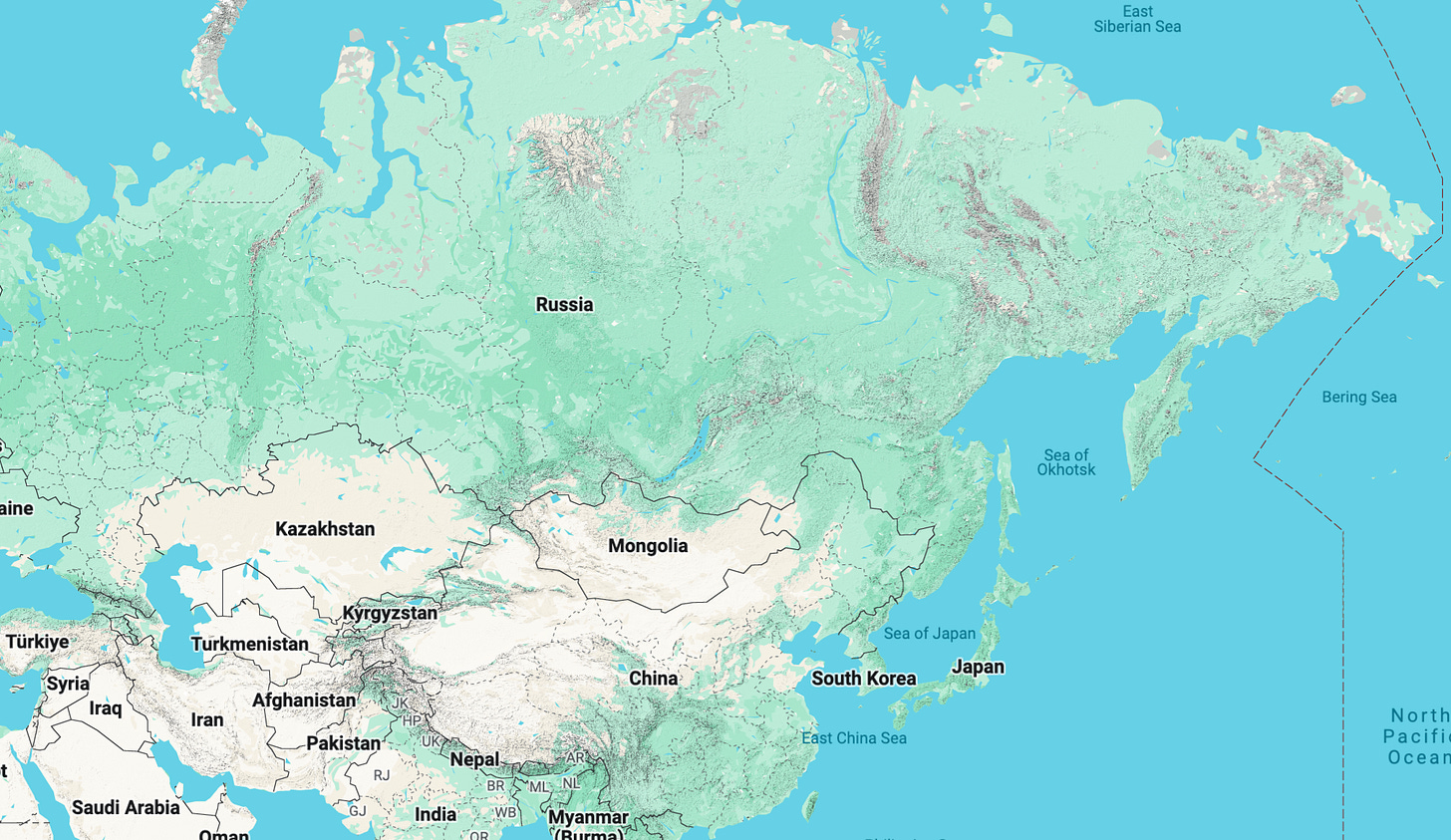I find it difficult to perceive the scale of the world. Doing so involves a kaleidoscopic sort of mental gymnastics in an attempt to reframe my notion of what constitutes bigness or smallness, and no perspective seems the right one to settle on.
Travel complicates the exercise because, in hindsight, distances shrink. Spend a dull day on the French autoroute or the German autobahn and you’ll be pleasantly surprised by the distance you’ve covered by nightfall. “Well that wasn’t so bad! Pity about the tolls though.”
The maths is simple enough. Eight hours of driving at 70+mph will add up to an easy 500 miles or more in a day. (That’s the distance from Land’s End to Edinburgh.) If you’re gunning for it, over 1000 miles can be driven in 24 hours. But it doesn’t feel right to travel this way.
The illusion of ease only manifests after the event. At the time, when you’re droning along for hour after hour, it always feels like you’re driving a long way, because you are. Not in comparison to what a modern car is capable of, not in comparison to the distance covered by a migrating bird or butterfly or an aircraft or a beam of light – but for an earthbound, bipedal homo sapiens with a body clock and a bladder, who has barely had time to evolve since inventing the wheel a mere 6000 years and 240 generations ago.
Banal hugeness and immensities of humdrum
You can reach Greece from the UK with only two tanks of diesel. This seems odd, considering most of us visit the pumps every week or two but consider a drive all the way across Europe to be a huge schlep. One tank will get you to Switzerland, the other will get you to Venice, and from there a ferry will take you to Patras in the Peloponnese. Then you need just half a tank more to reach Athens, or the southernmost tip of the Mani peninsula on the same latitude as Tunis. Only two-and-a-half tanks of diesel to be as far away as Africa – easy!
Driving from Scotland to the south of Greece and back was the biggest drive of my life, yet the distance represents only 6% of my 17-year-old car’s total mileage. Not that big a deal. And because I took nearly three months over it (stopping and working as I went) my monthly distance was comparable to what most people cover when shackled to their daily school runs, shopping trips and commutes to work.
We drive vast distances on humdrum journeys like these. In the UK, cars average about 7000 miles per year, and 10,000-15,000 miles is perfectly common – even for those that are rarely driven more than 100 miles from home. This is the equivalent of driving from Scotland to Nordkapp in the Arctic Circle, then to Istanbul, then round to Gibraltar and back up to Scotland (a roughly 10,000-mile loop) every single year. The thought of actually driving such a once-in-a-lifetime privilege in a humble Vauxhall Astra seems like an impossible ordeal, but that’s precisely the kind of mileage that millions of us drive all the time. And we think it’s normal.
Everything seems tiny from the air
Even a whole year of driving represents only one tank of fuel for an airliner. I gained a sense of this when flying back from Sydney to the UK last year – an awe-inspiring but uncomfortable ordeal, and not only due to my pancaked derrière. First you have to traverse the entire width of Australia (over 3000 miles), then cross the Timor Sea and the islands of Indonesia before stopping to refuel in Singapore. By this point you’ve no idea whether you want breakfast or dinner, but you still have virtually the entire span of the Eurasian continent ahead of you. In the context of a journey like this, the final squirt across Europe is just a short hop for your Boeing 777-300ER whose two General Electric turbofans, pushing over 115,000lbs of thrust each, can fly nearly 10,000 miles at 40,000ft in a single hop – immediately after doing the same thing in the opposite direction for 300 other people who consider such insane capability to be their well-earned right.
“The entire span of the Eurasian continent?” If that phrase passed you by without causing you to question it then you, like me, are blind to the unfathomable expanse of Siberia that stretches eastward from, let’s say, the Lena river – a region as vast as the whole of China, where the difference between maximum and minimum temperatures, summer to winter, can exceed 100 degrees. Not Farenheit but Celcius. (Imagine being someone for whom that deep space is not a blank, forgettable void but a peopled, storied landscape; imagine being Russian.)
Don’t ask me where I’m going with all this. I don’t have a point or a message or a realisation to share – other than a generic sort of Brian Cox-esque “Ooh, isn’t everything massive”. We know the atmospheric results of burning fossil fuels for travel; we know the value of seeking solace close to home rather than beneath some distant palm tree; we know what we ought to do, and I’m in no position to lecture. Zooming out for a bigger perspective doesn’t always lead to compassionate reasoning (“I only murdered one orphan, your honour…”) and nor does staying in our bubbles.
But what I’m feeling, rather than reasoning my way towards, is an inkling that I have taken large-scale movement for granted while disproportionately over-accounting for the impact of smaller-scale journeys. The fact that this resonates right now is perhaps a sign that I am making similar, more salient errors in other dimensions of life. This is something I need to work out.







A small epiphany I had while rereading this: perhaps our attempts to scale the universe feel arbitrary because everything is composed of different-sized infinities (at least theoretically, provided the notion of infinite smallness, beyond quark length). Just a passing thought that might tie in with the relativity of perception you've outlined.